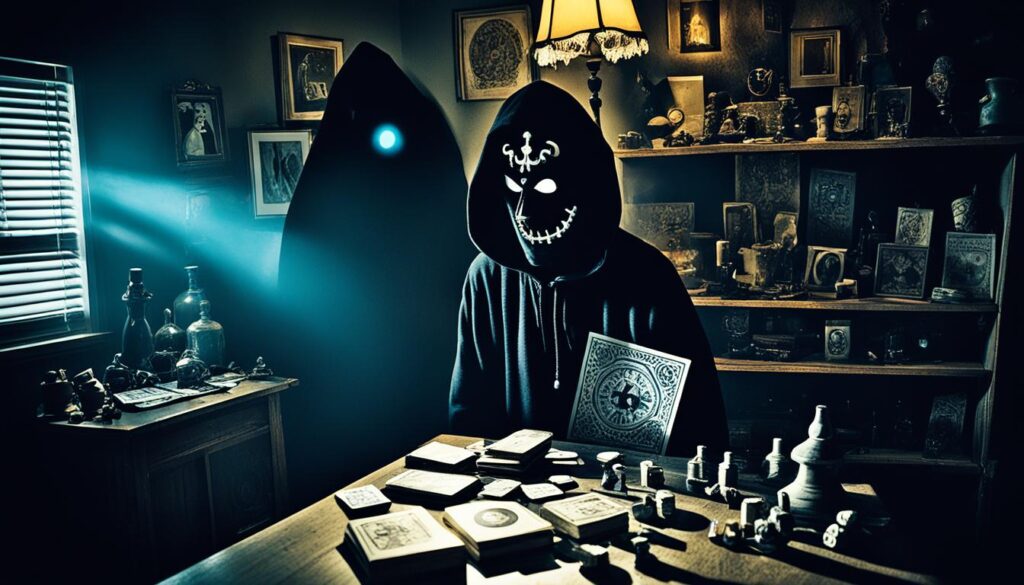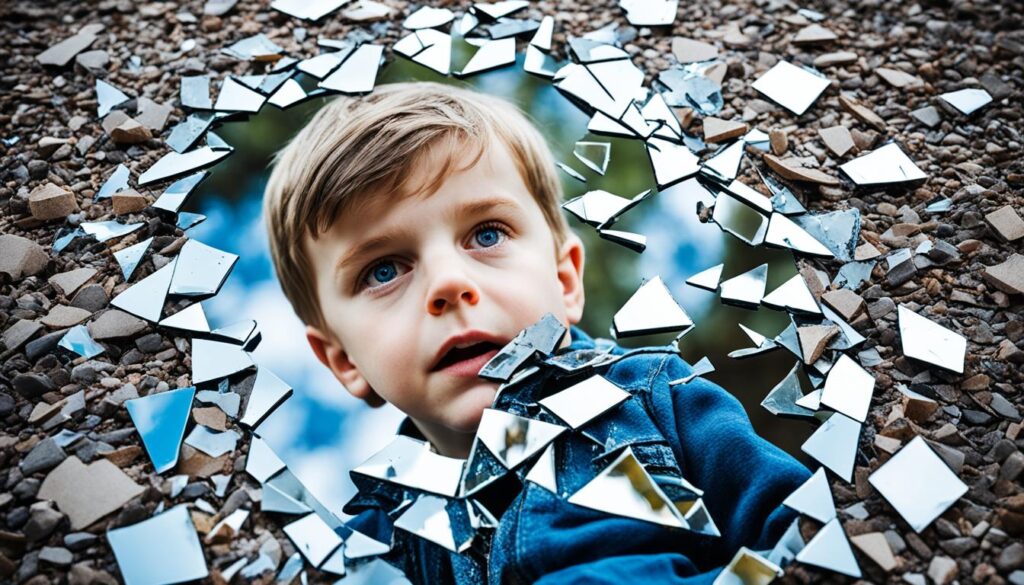Imagine a world where the line between what we see and what we can’t see is very thin. A world where things like ghosts and psychic feelings are real, not just stories. We’re going to look into how paranormal stuff and mental health are connected.
This topic is really interesting. It shows how seeing supernatural things can affect our mental health, and how our mental health can affect what we believe. We’ll talk about how our minds shape our beliefs and how believing in the paranormal can show up in our mental health.
Key Takeaways
- About half of people in Western societies believe in the paranormal.
- Believing in the paranormal is linked to more mental health issues, like feeling depressed or having psychosis.
- Beliefs in the paranormal can help or hurt our mental health. It can make us feel better or worse, depending on the situation.
- How our minds work and our mental boundaries affect if we believe in paranormal things.
- Bad experiences in childhood and tough times in life can make people believe in the paranormal as a way to cope.
Introduction
Many people in Western societies believe in the paranormal, with about 50% of them saying they do. This shows how important these beliefs are and why they need to be studied. Research often finds that believing in the paranormal can lead to more mental health issues.
Studies have looked into how common these beliefs are in different cultures. Many people say they’ve experienced things like telepathy, seeing ghosts, and knowing the future. These strange experiences are being studied to understand them better and how they affect our mental health.
| Country | Prevalence of Paranormal Beliefs |
|---|---|
| North America | Over 50% of the population report at least one paranormal experience |
| Great Britain | 64% believe in unexplainable powers, 47% in thought reading, and 34% in psychokinesis |
| Europe | Substantial minority of the population claims to have had a direct personal experience of the paranormal |
| Brazil | Reported prevalence of paranormal experiences varies across different cultural groups |
| Asia | Anomalous experiences are seen as bizarre and deviate from ordinary experiences, not fully understood by science |
These findings show we need to understand more about why people believe in the paranormal. By looking into how these beliefs affect mental health, researchers can learn a lot. This could help us understand how these beliefs impact our well-being and society.
Paranormal Belief and Mental Health Correlations
Research has found a strong link between believing in the paranormal and mental health issues. People who believe in things like superstition often have worse psychological adjustment and more depressive, manic, and psychotic symptoms. This shows how believing in the paranormal might be a way to cope with feeling out of control or uncertain about life.
The Paranormal Health Beliefs Scale (PHBS) is a 31-item tool used to measure these beliefs. It looks at beliefs in religious, superstitious, and other unusual events. This helps us understand how believing in the paranormal affects our mental health.
Psychopathological Symptoms
Studies show that those with strong paranormal beliefs tend to be more neurotic and have lower self-efficacy. They also tend to hold irrational beliefs. These traits increase the risk of depressive, manic, and psychotic symptoms. This highlights how paranormal beliefs can affect mental health.
“More than half of the population has had at least one paranormal experience.”
Also, paranormal beliefs can harm health behaviors. They might lead people to avoid regular healthcare and prefer unproven treatments instead.
Researchers are still studying how paranormal belief and mental health are connected. This area needs more research to understand its effects on mental health and well-being.
The Connection Between Paranormal Activity and Mental Health
Recent studies have found a link between paranormal beliefs and mental health. They looked at how our minds work and how our beliefs affect our mental health. This shows us how paranormal activities and our mental health are connected.
A study with over 3,000 people found a link between believing in the paranormal and being open to unusual experiences. People who believed in the paranormal also had certain mental health traits. These traits include being a bit odd or having mood swings.
The study also found something interesting. When people were open to unusual experiences and had certain mental traits, they were more likely to feel bad. This shows how our beliefs and mental health can affect each other.
| Statistic | Value |
|---|---|
| Participants who completed questionnaires | 162 |
| Significant correlations found | Paranormal experiences and mental boundaries, traumas, and negative life events |
| Participants who were female | 71.6% |
| Median age of participants | 28.64 years |
These findings show how complex the link is between paranormal beliefs, how we see the world, and our mental health. By studying this, researchers can learn more about the effects of paranormal experiences on our well-being.
“Over half of the general population reports at least one paranormal experience.”
Adaptive and Non-Adaptive Functions of Paranormal Belief
Paranormal beliefs have both good and bad sides. They can be a way to avoid dealing with uncertainty and feeling out of control. But, this avoidance can make it hard to adjust and connect with reality.
Yet, research shows that paranormal beliefs can also be helpful. They can help people make sense of their feelings and develop their identity. This can be especially true for those facing tough times or big questions about life.
Non-Adaptive Functions
Believing in the paranormal can be a way to feel in control when things are uncertain. This can stop people from growing and adapting. It lets them avoid the real challenges of their lives.
Adaptive Functions
On the other hand, these beliefs can bring comfort and hope. They can help people feel connected and give them a sense of purpose. This can improve their mental health and how well they adjust to life.
Understanding how paranormal beliefs work is complex. We need to look closer to see how they affect our mental health.

| Non-Adaptive Functions | Adaptive Functions |
|---|---|
|
|
“Paranormal beliefs can serve as both a maladaptive coping strategy and a source of adaptive psychological functions, highlighting the complex and nuanced nature of this phenomenon.”
Cognitive-Perceptual Factors and Mental Boundaries
Researchers have found a strong connection between paranormal beliefs and mental health. They discovered that Transliminality, a way to measure mental flexibility, affects how well people feel. It shows that those who believe in the paranormal often have thinner mental boundaries.
This means they might struggle more with their mental health. Factors like Transliminality, Unusual Experiences, and Cognitive Disorganisation are linked to worse mental health.
It turns out, some mental boundaries are connected to believing in the paranormal. This shows how important it is to understand how our minds work and what we believe in. It also shows how our beliefs can affect our mental health.
| Cognitive-Perceptual Factor | Description |
|---|---|
| Transliminality | A cognitive-perceptual factor reflecting thin mental boundaries, which interacts with paranormal belief in predicting negative well-being outcomes. |
| Unusual Experiences | A dimension of Schizotypy, associated with poorer mental health and functioning within the realm of paranormal believers. |
| Cognitive Disorganisation | A dimension of Schizotypy, associated with poorer mental health and functioning within the realm of paranormal believers. |
These findings show how complex our minds are. They reveal how our beliefs and mental flexibility can affect our mental health. It’s important to understand this to help people with paranormal beliefs.
Childhood Trauma and Negative Life Events
Recent studies have shown a link between paranormal experiences and tough times in life, especially during childhood. The study found strong links between paranormal experiences and both childhood trauma and recent negative events.
This means that childhood trauma, like emotional abuse, and negative life events might make people more open to paranormal phenomena. The study shows we need to understand how these tough experiences affect how we see the world.
Interestingly, the study found that paranormal experiences happen more often after big negative life events. This shows how people might turn to the paranormal to understand their tough times.

The study highlights the need to help those who’ve had childhood trauma or negative life events. Mental health experts can offer support and help to lessen paranormal experiences by addressing these emotional needs.
Psi Abilities and Paranormal Experiences
The study looked into how psi abilities, paranormal experiences, and psychology might be linked. But, the results for the psi task were not significant. There was no strong link found between the psi task and the participants’ beliefs, mental boundaries, or childhood trauma.
Some interesting findings came out:
- A sample of 516 adults was studied, and 4 groups were found based on their paranormal experiences.
- There was a link between paranormal experiences and trouble with executive functions. These include things like making decisions and paying attention.
- People more involved in the paranormal had trouble with reality and making decisions based on feelings.
- The study also looked at how paranormal beliefs affect thinking and how they relate to dopamine and decision-making skills.
The psi task didn’t show much, but the study showed how complex the links are between paranormal experiences, mental boundaries, childhood trauma, and thinking patterns. These findings help us understand better how psi abilities, paranormal experiences, and mental health are connected.
| Key Findings | Implications |
|---|---|
| No significant correlation between psychological variables and psi results | This suggests that mental boundaries and childlike traits are linked to paranormal experiences. These experiences happen more often after tough life events. |
| Relationship between paranormal experiences and executive functioning difficulties | This shows the need to understand how thinking and perception affect paranormal beliefs and experiences. |
| Association between paranormal belief and cognitive-perceptual factors | This highlights the need for more research on how psychological and biological factors interact in paranormal phenomena. |
This study’s findings add to our understanding of the link between psi abilities, paranormal experiences, and mental health. Even though the psi task didn’t show much, the study’s insights into the complex links between psychology and paranormal phenomena are valuable for future research.
Conclusion
The link between paranormal belief, experiences, and mental health is complex. Some studies show that believing in the paranormal can affect mental health. But, it’s not a simple story.
Paranormal belief and experiences can be helpful too. They can help people make sense of their lives and deal with tough emotions.
Childhood trauma and negative events play a big role in paranormal experiences. This shows we need to understand paranormal phenomena better. We must see how they affect our mental health and how we function.
This study shows how paranormal beliefs and human psychology are connected. By studying this connection, we can learn more about our minds and how we see the world. It’s a fascinating topic that can teach us a lot.
FAQ
What is the connection between paranormal activity and mental health?
Studies look into how believing in the paranormal affects our mental health. Believing in the paranormal can lead to worse mental health and more symptoms like depression and psychosis. It might be a way to cope with feeling uncertain and out of control.
How do cognitive-perceptual factors and mental boundaries relate to paranormal belief and mental health?
The study found that how well our minds separate different thoughts and feelings affects our belief in the paranormal. This belief can lead to worse mental health. Within those who believe in the paranormal, certain ways of thinking are linked to poorer mental health.
What is the relationship between childhood trauma, negative life events, and paranormal experiences?
The study found a link between paranormal experiences and both childhood traumas and recent negative events. Emotional abuse is often linked to believing in the paranormal. This shows that paranormal experiences are more common after big negative events in life.
Is there a connection between psi abilities, paranormal experiences, and related psychological variables?
The study found no strong link between psi abilities and paranormal experiences. There was no clear connection between psi task performance and mental health or childhood trauma. This suggests that psi abilities don’t directly relate to believing in the paranormal or past traumas.
Source Links
- Paranormal belief and well-being: The moderating roles of transliminality and psychopathology-related facets – https://www.ncbi.nlm.nih.gov/pmc/articles/PMC9421129/
- Do Paranormal Beliefs Indicate Poor Mental Health? – https://www.psychologytoday.com/us/blog/articles-of-heterodoxy/202208/do-paranormal-beliefs-indicate-poor-mental-health
- Mental Health and the Paranormal – https://digitalcommons.ciis.edu/context/ijts-transpersonalstudies/article/1094/viewcontent/IJTS_31_1_08_pp_61_74_Dein_2012_Mental_Health_and_the_Paranormal.pdf
- Paranormal beliefs and cognitive function: A systematic review and assessment of study quality across four decades of research – https://www.ncbi.nlm.nih.gov/pmc/articles/PMC9067702/
- Introduction – https://www.aseanjournalofpsychiatry.org/articles/a-revisit-to-paranormal-beliefs–when-is-it-a-psychiatric-disorder.pdf
- Frontiers | The paranormal health beliefs scale: an evaluation using cognitive interviewing – https://www.frontiersin.org/journals/psychology/articles/10.3389/fpsyg.2024.1306372/full
- Exploring the relationship between paranormal experiences, mental health and boundaries, and psi – https://www.pure.ed.ac.uk/ws/files/15053372/RabyronWattAcceptedMS.pdf
- On the Adaptive Value of Paranormal Beliefs – a Qualitative Study – https://www.ncbi.nlm.nih.gov/pmc/articles/PMC7813974/
- Paranormal Health Beliefs: Relations Between Social Dominance Orientation and Mental Illness – https://openpsychologyjournal.com/VOLUME/11/PAGE/35/FULLTEXT/
- The Cognitive Psychology of Belief in the Supernatural – https://www.americanscientist.org/article/the-cognitive-psychology-of-belief-in-the-supernatural
- Differences in Cognitive-Perceptual Factors Arising From Variations in Self-Professed Paranormal Ability – https://www.ncbi.nlm.nih.gov/pmc/articles/PMC8222626/
- Development of the Paranormal and Supernatural Beliefs Scale using classical and modern test theory – BMC Psychology – https://bmcpsychology.biomedcentral.com/articles/10.1186/s40359-021-00600-y
- Are Horror Movies Bad for Your Mental Health? – https://www.healthline.com/health/how-do-horror-movies-affect-your-mental-health
- Are You Seeing Ghosts? – https://www.domesticshelters.org/articles/health/are-you-seeing-ghosts
- What Is Fear of Ghosts (Phasmophobia)? – https://www.verywellhealth.com/fear-of-ghosts-5211738
- Paranormal Experience Profiles and Their Association With Variations in Executive Functions: A Latent Profile Analysis – https://www.ncbi.nlm.nih.gov/pmc/articles/PMC8784801/
- Frontiers | Paranormal belief, cognitive-perceptual factors, and well-being: A network analysis – https://www.frontiersin.org/journals/psychology/articles/10.3389/fpsyg.2022.967823/full
- 3 Paranormal Experiences That Have Caught The Attention Of Mental Health Researchers – https://www.forbes.com/sites/traversmark/2022/07/01/3-paranormal-experiences-that-have-caught-the-attention-of-mental-health-researchers/
- Why It’s Normal to Believe in the Paranormal – https://www.psychologytoday.com/us/blog/presence-of-mind/202310/why-its-normal-to-believe-in-the-paranormal
- Vatican publishes new norms to discern alleged supernatural phenomena – https://www.usccb.org/news/2024/vatican-publishes-new-norms-discern-alleged-supernatural-phenomena

